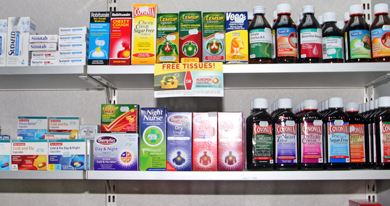I have just got over – I hope I have – a nasty doze of flu. Thankfully I had the flu jag last autumn and it probably prevented the worst of it.
The flu hit me very suddenly. I had just come home from a meeting in the evening and felt fine. Suddenly my head was light and starting to ache, I was sweating, I was burning up, I felt just horrible. I had an uncontrollable violent shiver. My eyes were aching too, so computer work was out of the question. Before the hour was up I was a quivering shaking wreck, a jelly of a human being, that neither hot water bottle nor hot whisky could cure or alleviate.
[caption id="attachment_55476" align="alignleft" width="390"] The flu may be on the wane this season, but are you getting prepared for this autumn?[/caption]
The flu may be on the wane this season, but are you getting prepared for this autumn?[/caption]
And so it was for a few days. Then as I came back to my old self, I found that my energy levels were very low, my memory was shattered, and my concentration span was like that of an earthworm. It was quite devastating and worrying. Especially when people were saying, ‘I took it last November and it still hasn’t cleared up‘. The frayed strings of my human mortality were indeed plucking.
I started taking paracetamols initially within the hour the symptoms broke thinking I could head this flu off at the pass – two tablets four times a day. But I was given expert advice by someone whose doctor suggested soluble co-codamol. It really did work wonders despite the severity of the attack.
Despite my best attempts to garner some sympathy on Facebook, I received the usual hardy comments from my ‘Friends’ such as ‘man up’. So I quietly withdrew into my little cosmos in front of the fire on the sofa with the TV controls and spooned in the c0-codamols, honey, hot drinks (including my favourite!) and buried myself in a blanket and toughed it out.
So, by way of public health information, I’ve attached details released from the Public Health Agency on the flu hoping that it will help inform what flu is, how it affects you, and how best to deal with it etc.
***
The Public Health Agency (PHA) is reminding the public what action they can take to help prevent catching seasonal flu as it continues to circulate.
Dr Lucy Jessop, PHA Consultant has advised: “Even after you have received the flu vaccine, it is still important to maintain good hygiene. This will help to reduce the risk of picking up or spreading winter viruses such as flu and norovirus. Hand washing with soap and warm water is the most effective way to prevent the spread of infections, as well as covering your nose and mouth with a tissue when coughing or sneezing and disposing of it quickly and carefully in a bin.
“If you do get flu, the PHA’s advice is to:
*stay at home and don’t spread your infection to others
*rest
*drink plenty of fluids
* use over-the-counter remedies if they make you feel more comfortable
* also avoid visits to friends or relatives in hospital or residential and nursing homes when you or they have symptoms.
“Receiving the seasonal flu vaccine is still the best way to help protect yourself and others from getting the virus, so if you are in an ‘at risk’ group or pregnant get the vaccine now. It takes approximately 10 days to develop protection against flu following vaccination.”
Flu symptoms If you’ve got flu you’re likely to develop some or all of the following symptoms: * a sudden fever, with a high temperature (generally above 38°C/100°F) * a chill * a severe headache * muscle aches and pains * a sense of feeling weak and tired * a dry cough * a sore throat
Dr Jessop continued: “Flu symptoms usually peak after two or three days and you should begin to feel much better within five to eight days. If you are becoming more ill, or you are in an at-risk group, then contact your GP for advice. Elderly people or those in ‘at risk’ groups may develop complications that can lead to serious illness and can be life threatening. That is why it is vital to get the seasonal flu vaccine if it is offered to you, and to maintain good hand hygiene.”
For more information on seasonal flu go to:
www.facebook.com/publichealthagency
www.twitter.com/publichealthni
What is flu?
Flu occurs every year, usually in the winter. It is a highly infectious disease caused by a virus. Symptoms include fever, chills, headache, aching muscles, cough and sore throat – and because flu is a virus, antibiotics won’t help. People sometimes call a bad cold the flu, but really, having flu is much worse. What harm can flu do?
At best it is a nasty experience, even for people who are usually fit and healthy. However, it can lead to more serious illnesses such as bronchitis and pneumonia, or can make existing conditions worse. In the worst cases, flu can result in a stay in hospital or even death.
Flu infection during pregnancy can have serious consequences for both mother and baby. Who should get the flu vaccine?
The following are at greater risk from the effects of flu and should get the vaccine: * Pregnant women. * Anyone aged 65 or over, even if they feel fit and healthy at the moment. * Children and adults who have any of the following medical conditions: – a chronic chest condition such as asthma; – a chronic heart condition; – chronic liver disease; – chronic kidney disease; – diabetes; – lowered immunity due to disease or treatment such as steroids or cancer therapy (people living in the same house as someone with lowered immunity may also need to be vaccinated); – a chronic neurological condition such as, stroke, multiple sclerosis or a condition that affects your nervous system, such as cerebral palsy; – any other serious medical condition – check with your doctor if you are unsure. * Children who have previously been admitted to hospital with a chest infection. * Children attending schools for children with severe learning difficulties. * Anyone living in a residential or nursing home. * Main carers for elderly or disabled people. – you should seek advice from your GP surgery as to whether you should be vaccinated so you can continue to look after the person you care for. You should also ensure that they are vaccinated (if recommended).
Vaccination for children in at-risk groups
This year most children aged from 2 years up to less than 18 years in at-risk groups will be offered a vaccine that is given as a spray into the nose instead of an injection. This vaccine has been used for several years in the USA and has been shown to be more effective in children and to have a very good safety record.
Is the vaccine safe for pregnant women?
Yes. Pregnant women should get the vaccine regardless of their stage of pregnancy. They will be offered it by their GP. The flu vaccine is licensed for use in pregnancy by the European Medicines Agency. It has been regularly used for pregnant women in other countries. Millions of pregnant women have received the flu vaccine in the USA, where its safety has been carefully monitored. This has shown the vaccine to be safe for pregnant women and their babies.
]]>























